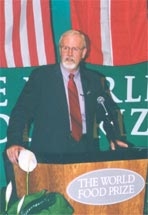Risks to the World Food Supply
2001 Transcripts by Agenda | 2001 Speaker Biographies and Transcripts | 2001 Symposium Brochure (PDF)

Peter Chalk - Biological Agroterrorism Analyst, National Security Division, RAND Corporation
More than 800 people attended The World Food Prize International Symposium, "Risks to the World Food Supply" on October 18-19 in Des Moines--what was arguably the most focused conference in the world on Agroterrorism and Bioterrorism since the attacks in New York and Washington.
Those who attended heard a series of experts and policy officials give riveting presentations which revealed that agriculture, a highly critical sector of the U.S. economy, could be extremely vulnerable to terrorists trying to introduce animal and plant diseases. The bottom line conclusion for many at the symposium was that such an attack would be easy to do and could produce "mass economic dislocation," since agriculture makes up one-sixth of the U.S. national economy.
Peter Chalk, a Bioterrorism Analyst at the Rand Corporation, noted that the U.S. livestock industry is particularly vulnerable to agroterrorism because it is primarily made up of large operations that are highly concentrated, making the spread of diseases easier and an epidemic harder to control. He said that terrorists could covertly introduce anthrax, Foot and Mouth Disease or any one of 22 other foreign animal diseases into the U.S., which would be difficult to eradicate and enormously costly.
Chalk echoed a point made by World Food Prize President Kenneth M. Quinn in a September 23 television interview in which he stressed the need for a coordinated national reporting system that would promote a rapid and effective response to limit and contain any outbreak of such diseases.

Dr. Bernard Schwetz - Principal Deputy Administrator of the U.S.Food and Drug Administration
David Shannon of the UK Department of Environment, Food and Rural Affairs told the Symposium attendees that the recent outbreak of Foot and Mouth Disease in Great Britain led to the slaughter of 5.5 million head of livestock at the cost of $3 billion.
Dr. Michael Doyle, Director of the Center for Food Safety at the University of Georgia, stressed the importance of workforce security in the food industry. He noted that the food processing industry has become so centralized, with one facility often distributing nationwide, that one act of bioterrorism could sicken millions of people.
Dr. Bernard Schwetz, the Principal Deputy Administrator of the U.S. Food and Drug Administration, gave a major presentation on "Food Terrorism," which outlined the steps being taken by his agency to protect the U.S. food supply from any such efforts to taint it. While emphasizing that the probability of food terrorism is low, Schwetz explained that the FDA has developed plans closely linking his agency to state and local governments which would be the first to respond in case of a terrorist food attack. Moreover, he emphasized that the FDA has been meeting with growers, processors and shippers to put in place other mechanisms to keep the food supply safe.
The 2001 World Food Prize Laureate, Dr. Per Pinstrup-Andersen, brought both issues—world hunger and global terrorism—together in his Laureate Address, which argued that terrorism and the despair of the poor in developing countries are inextricably linked. He stressed that future stability will be linked to efforts by the developed world to eradicate hunger and malnutrition.

Dr. Per Pinstrup-Anderson - 2001 World Food Prize Laureate
Dr. Norman E. Borlaug, Nobel Peace Prize Laureate and a founder of The World Food Prize, also spoke at the symposium. His topic was Biotechnology and the crucial role he sees for it in feeding and enhancing the nutrition of the more than one billion persons still living in tenuous food security, particularly in Africa, but also in Afghanistan and other parts of South Asia.
At age 87, Borlaug is still going strong, traveling around the world to promote greater attention to, and investment in, rural infrastructure (particularly roads and bridges), agricultural research and education. Dr. Borlaug believes all these are essential if we are to have the next "Green Revolution," which will lift the remaining one billion people out of the misery of malnutrition and end pandemic poverty. As President of the Sasakawa 2000 Foundation, Borlaug has turned his efforts to sub-Saharan Africa—the last great frontier in the battle to end world hunger.


